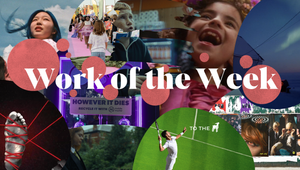
Your Shot: Sam Spiegel Is Set to Blow Up With ‘Jihad Love Squad’

As the producer behind hip-hop duo N.A.S.A, Sam Spiegel isn’t shy of shouting out about what’s on his mind. The talented Los Angeles local has recently broadened his scope putting his visual skills to the test as the director behind his very own fast paced music video ‘Jihad Love Squad’. Daring to take on one of the world’s most controversial subjects, it comes as no surprise that the clip is getting attention.
Better known in adland for his work scoring commercials for companies including Converse, Levi's, Reebok and ESPN, it would seem the sky’s the limit for this multi talented creative whose love of hip-hop and straight talk has us eager for more. Here he catches up with LBB’s Larissa Meikle to discuss his latest project ‘Jihad Love Squad’ and his exciting new foray into directing.
LBB> Over the past 20 years, the West and the world of Islam are so polarised in mainstream media. By painting a different picture with music video ‘ Jihad Love Squad’, what kind of reaction are you getting?
Sam Spiegel> So far, it’s been very positive! There was a lot of fear within my team about how the Muslim world would react to the video, and the thing that’s made me really excited is Muslims seem to have really embraced it so far. Whether it’s in the press or via social media, Muslims are gravitating to 'Jihad Love Squad', recognising its positive intention, and appreciating it for what it is… a message of love and unity.

LBB> What inspired you to take on what is essentially a globally sensitive topic - fighting a Holy War with love and re-contextualising the word ‘jihad’?
SS> I just find it to be a really interesting story that’s happening in our world right now. I think it might have been a reaction to having this terrible stereotype of violent Muslim men shoved down my throat so adamantly by the US media.
LBB> How did you source your lead talent and dancers?
SS> I was put in contact with a great producer in India name Hari Bala, from a friend here in LA. He found everyone for me. I couldn’t have made the video without him.
LBB> Where did you film and what was it like to shoot in this location? Any challenges you had to overcome on the day?
SS> We shot in Mumbai India. It was 115 degrees with the heat index every day, and Mumbai is also the most densely populated place on earth. We were shooting on the street and it was PACKED. It was nuts… Total chaos… People everywhere, baksheesh to police, pulling over the freeway overpass to shoot while cars flew by honking, exploding kids, dancing. It was one of the most fun creative experiences I’ve ever been a part of.

LBB> How did you ensemble your creative team on ‘Jihad Love Squad’ - what do you look for in your collaborators?
SS> I really went by instinct. If someone fitted the aesthetic and idea that I had in my mind, and they seemed like they’d be fun and positive collaborators, then I wanted to work with them.
LBB> As one of the producers behind the hip-hop duo N.A.S.A, what was it like being your own ‘client’ on ‘Jihad Love Squad’?
SS> THE BEST!
The best thing is to work for yourself on your own project and to see it through from start to finish. That being said, I also gain a lot of pleasure from working with other people on their projects and serving their visions too.

LBB> As a producer/DJ and composer, it’s fair to say you’re familiar with ‘creative process’. During your first foray into directing, what were some of the unexpected things you learned along the way?
SS> It was just really intense how many different things you have to hold in your mind when you’re directing. I found myself watching the video during the edit and being overwhelmed with all of the elements that I had to be aware of, and make sure were great – rather than just having to worry about the music and score.
LBB> Can you tell us more about where your love of hip-hop stems from?
SS> I grew up in New York City during the golden age of hip-hop. It was a great time for hip-hop. I used to tape mix shows off the radio every week, and every week there was a ton of new super dope songs. It was an exciting time for music in general, and not just on the East Coast.

LBB> You wrote the score for Spike Jonze's 2010 short film ‘I’m Here’. Has working alongside your brother helped you in your observation of the filmmaking process?
SS> Yes, I’ve definitely learned a lot by just being around him and watching such a great filmmaker do his thing. He’s so passionate and works so hard to reach greatness. He’s also great at dealing with the talented people around him – who are often pretty complicated (as many artists are), and getting the best out of them.
LBB> In general, do you think musicians, and their unique set of skill sets, make good film directors – when it comes to a storylines mood, tempo and pace?
SS> I can’t say. It’s interesting though, how much more intellectual I find filmmaking than music. Often when I’m making music, it’s just flowing out of me, and I don’t know what it means or where it’s coming from. Filmmaking is so much more calculated and the performance in the moment is just one aspect of the creative process. You have to really understand what creative choices mean, and why they need to be a part of your project.
















